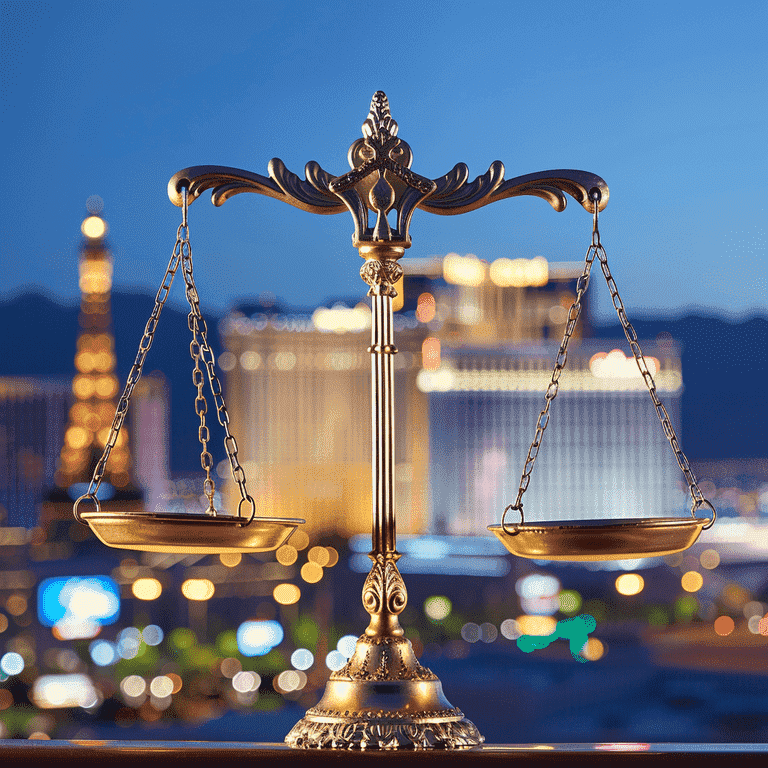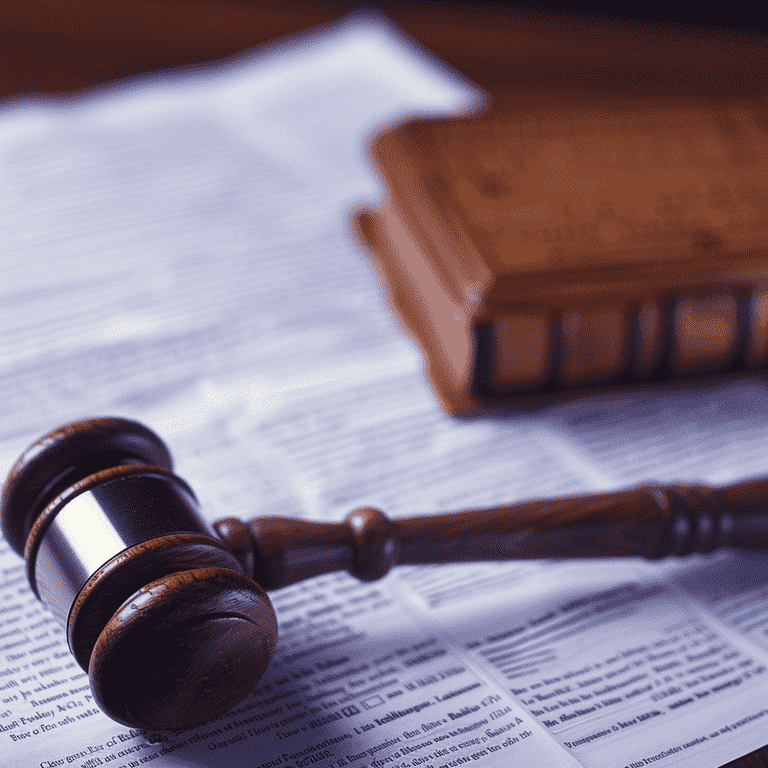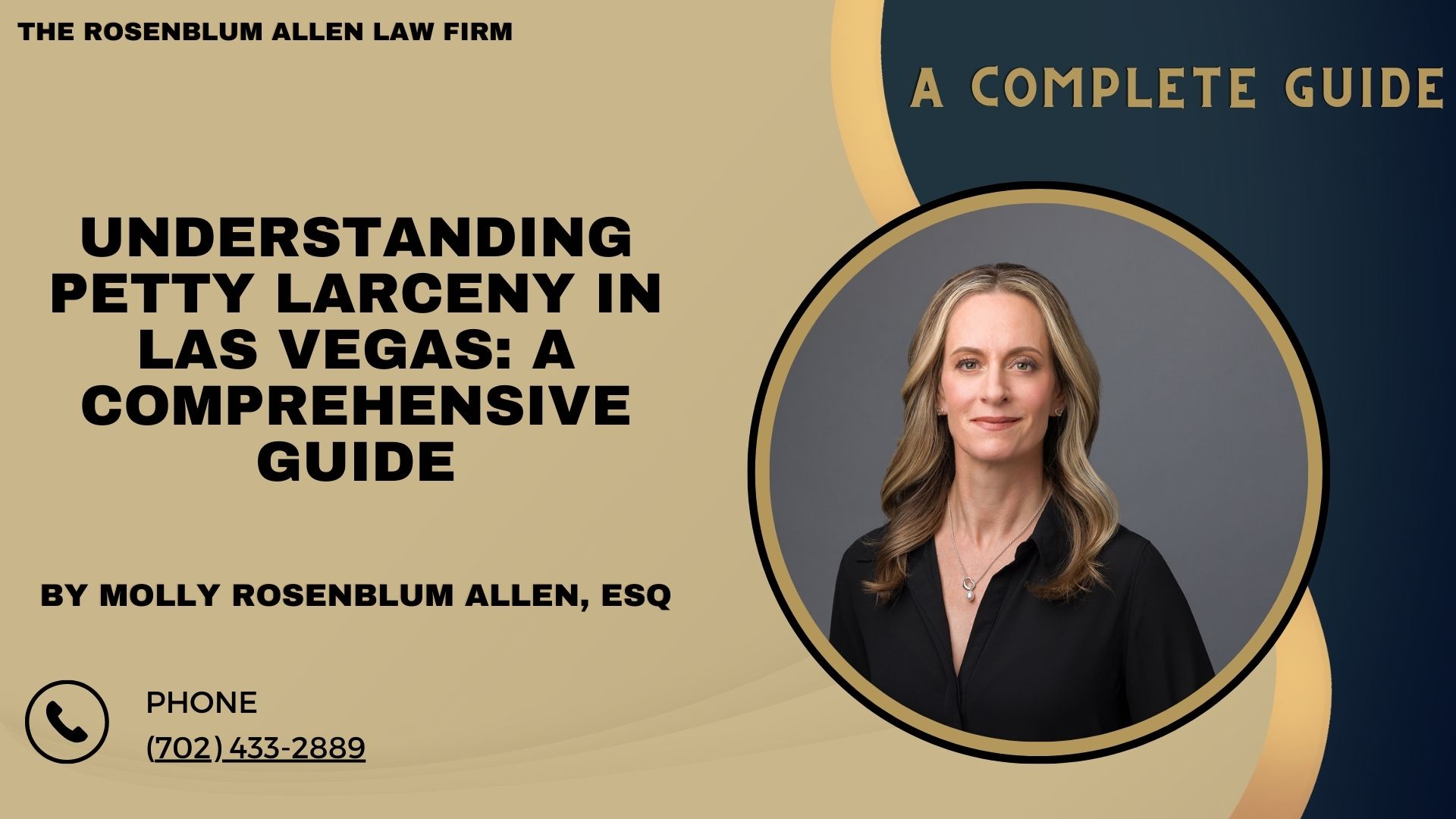Welcome to your go-to guide on navigating the complexities of petty larceny in Las Vegas. Are you a resident, a concerned citizen, or facing charges? This article aims to clarify and empathize on the issue. The law can seem like a maze. But, with the right info, you’ll find the confidence to navigate it.
Petty larceny is often linked to minor thefts and shoplifting. It holds specific legal meanings in the lively city of Las Vegas. The neon lights and bustling streets mean fun. But, the laws remain in place to guard against bad behavior. This section introduces you to petty larceny basics. It highlights the need for legal help in such matters.
Definition of Petty Larceny
The law precisely defines petty larceny in the heart of Nevada. The law distinguishes it from its more severe counterpart, grand larceny.
Legal Definition in Nevada
Petty larceny in Nevada means taking property unlawfully. Traditionally, appraisers value the property under a certain threshold, typically $1,200. This classification is crucial. It decides the severity of the charges and the penalties.
Distinction Between Petty Larceny and Grand Larceny
Understanding the difference between petty and grand larceny is critical:
-
Petty Larceny: Involves property valued under $1,200.
-
Grand Larceny: Concerns property exceeding the $1,200 mark.
This difference is not just about words. It shapes the whole legal approach to the incident. It affects charges and potential sentences.

Laws Governing Petty Larceny in Las Vegas
Navigating Nevada’s legal landscape requires familiarity with the statutes specifically addressing petty larceny.
Nevada Revised Statutes (NRS) Relevant to Petty Larceny
The NRS carefully outlines the legal framework. It highlights the actions that are petty larceny and the consequences of them. Key statutes provide the backbone for understanding and prosecuting these cases.
Penalties and Consequences
The repercussions of a petty larceny conviction are more than just a slap on the wrist. They vary based on the circumstances. There are specific considerations for first-time versus repeat offenses.
First-Time Offenses
Typically, first-time offenders face:
-
Fines
-
Community service
-
Possible jail time
Repeat Offenses
The stakes are higher for repeat offenders, potentially leading to:
-
Increased fines
-
Extended community service
-
Longer jail sentences
Factors Influencing Charges and Penalties
Several factors can tip the scales in petty larceny cases, including:
-
Value of Stolen Property: The closer the value is to the $1,200 threshold, the more severe the potential penalties.
-
Criminal History: A clean record might lead to leniency, whereas a history of offenses could result in harsher sentences.
-
Location of the Theft: Stealing from a casino, for example, might be treated more seriously than from a retail store.
This guide starts by laying the foundation. It will help you understand petty larceny in Las Vegas. It covers definitions and laws. This ensures you have the knowledge to navigate these legal waters. Stay tuned. We will cover the legal processes and defenses more deeply. We will also cover the vital role of defense attorneys in later sections.

Legal Process for Petty Larceny Charges in Las Vegas
The legal process can seem daunting when faced with petty larceny charges in Las Vegas. But don’t fear. We’re here to guide you step by step. We’ll make sure you’re well-informed and ready for what lies ahead.
Arrest and Booking
If accused of petty larceny, the journey begins with an arrest. Here’s what typically happens:
-
Arrest: Law enforcement takes you into custody based on evidence or suspicion of theft.
-
Booking involves recording your name and the charge and taking fingerprints and photographs.
Arraignment and Plea Options
After your arrest, you’ll face arraignment. It’s a crucial moment. At it, charges are formally read, and you can respond. Your options are:
-
Plead guilty: Admitting to the charges.
-
Plead not guilty: Disputing the charges and requesting a trial.
-
No contest: Not admitting guilt but accepting the penalty.
Pre-Trial Procedures
Before a trial, both sides ensure they are prepared by taking several steps.
Discovery Process
Your defense and the prosecution share evidence, ensuring no surprises during the trial.
Pre-Trial Motions
These are legal requests to the court. They ask to dismiss charges or suppress evidence. The goal is to shape the trial.
Trial Process
If your case goes to trial, it follows a structured path:
Jury Selection
Both lawyers question a jury to ensure impartiality.
Evidence Presentation
Both sides present their case. The prosecution must prove guilt beyond a reasonable doubt.
Verdict
The jury deliberates and returns a verdict. If guilty, sentencing will follow; if not, you’re free to go.

Defenses to Petty Larceny Charges
Facing petty larceny charges doesn’t mean you’re out of options. You can use various defenses, depending on the specifics of your case.
Lack of Intent
Proving you had no intention to steal can be a powerful defense. You may have forgotten to pay or thought the item was already yours.
Mistaken Identity or Wrongful Accusation
Sometimes, you’re just in the wrong place at the wrong time. Demonstrating you were mistakenly identified can clear your name.
Ownership or Right to Possess
This defense could apply if you believed you had a right to the property or if it was yours.
Consent from the Owner
Showing that the owner permitted you to take the property negates the theft element.

The Role of a Defense Attorney in Petty Larceny Cases
Navigating the legal system without expertise is like walking through a maze blindfolded. Here’s where a defense attorney becomes your guide.
Evaluation of the Case
Your attorney will examine every detail. They will find strengths and weaknesses in the prosecution’s case.
Negotiating Plea Deals
Not all cases need to go to trial. Your lawyer can negotiate a deal for lesser charges. They can also arrange alternative sentencing, such as:
-
Reduction of Charges: Lower the offense level.
-
Alternative Sentencing Options: Such as community service instead of jail time.
Trial Representation
If your case goes to trial, your defense attorney is indispensable. They will:
-
Develop a Strategy: Tailored to the specifics of your case.
-
Cross-Examine Witnesses: To challenge the prosecution’s evidence.
You must understand the legal process. You must know the defenses available to you. This knowledge is crucial when facing petty larceny charges in Las Vegas. Having a skilled defense attorney by your side is equally important. They protect your rights and give you the best chance at a favorable outcome. Stay informed and prepared. Remember, the law is complex. But, with the right help, it’s navigable.

Consequences of a Petty Larceny Conviction in Las Vegas
The aftermath of a petty larceny conviction stretches beyond court-imposed penalties. It can ripple through your life, affecting various aspects in ways you might not initially anticipate.Criminal Record Implications
A conviction leaves a mark on your criminal record, which can be a shadow following you around, impacting future opportunities.- Background Checks: Employers and landlords often conduct these, and a conviction could sway their decisions negatively.
- Professional Licenses: Certain careers might be off-limits or require additional steps to prove rehabilitation.
Employment and Housing Challenges
The stigma of a criminal record can close doors in both the job market and the search for housing.- Job Applications: You might find yourself having to explain your conviction, which can be an uncomfortable conversation.
- Housing Applications: Landlords wary of legal troubles may hesitate to rent to someone with a criminal history.
Immigration Consequences
For non-citizens, the stakes are even higher. A conviction could affect your immigration status, including:- Deportation: In some cases, a conviction can lead to being removed from the country.
- Visa Renewal or Reentry: A criminal record can complicate visa renewals or reentry into the United States after travel.

Expungement and Sealing of Petty Larceny Records
There’s a silver lining: the possibility of having your record sealed or expunged, which can offer a fresh start.Eligibility Criteria
Not everyone qualifies for record sealing or expungement, and the criteria can be stringent. Factors include:- Time Passed Since Conviction: A certain period must elapse before you can apply.
- Completion of Sentence: All conditions of your sentence, including fines and community service, must be fulfilled.
Process and Requirements
The journey to clearing your record involves several steps and detailed documentation:- Obtain Your Criminal Record: You need to know exactly what’s on your record to address it.
- File a Petition: Submitting a formal request to the court, often requiring legal assistance.
- Court Review: The court examines your application and decides based on legal criteria and possibly a hearing.
Benefits of Record Sealing
Having your record sealed can be life-changing, opening doors that were previously closed:- Employment Opportunities: A cleaner record can make job hunting less daunting.
- Personal Reputation: Reducing the stigma and embarrassment that can come with a criminal record.

Preventing Petty Larceny Charges
Prevention is always preferable to dealing with the consequences. Here are some tips to avoid finding yourself on the wrong side of the law:- Public Awareness and Education: Knowing the law and its implications can deter potential offenses.
- Security Measures for Personal and Business Property: Effective security can prevent theft, reducing the temptation or opportunity for petty larceny.
Why You Have Not Hired a Felony Defense Attorney Yet
Watch this short video to take the next big step toward defending your rights against a felony charge.

Breaking It All Down
Facing petty larceny charges in Las Vegas can be scary. But, if you know the law and the defenses, you can prepare to navigate this tough time. Knowing the long-term effects can also help. Remember, the journey doesn’t end with a conviction. Options, like record sealing, can restore your reputation. They can help you reclaim your future.

More Frequently Asked Questions
Can charges for petty larceny be dropped before going to court?
Yes, charges can be dropped if there’s insufficient evidence or legal issues with the evidence. Charges may also be dropped if the victim doesn’t press charges or completes a pre-trial diversion program.
What sets apart petty larceny from grand larceny in Las Vegas?
Petty larceny involves property valued under a certain threshold, usually $1,200, while grand larceny involves property exceeding this value. Penalties and thresholds differ significantly between the two, with grand larceny carrying harsher consequences.
How long does a petty larceny charge stay on record in Las Vegas?
A petty larceny charge can remain on your criminal record indefinitely unless it’s sealed or expunged. The rules for record sealing vary, and you typically need to wait for specific periods after completing your sentence.
Can I travel outside the U.S. with a petty larceny conviction?
Traveling abroad with a criminal conviction can be complicated. Some countries may deny entry to individuals with a criminal record, especially for offenses involving moral turpitude like theft. It’s essential to check the entry requirements of the destination country beforehand.
How does a petty larceny conviction affect child custody cases?
A petty larceny conviction could influence child custody cases, as courts consider the best interests of the child. A criminal record might affect a judge’s decision on custody and visitation rights, portraying the convicted parent as irresponsible or morally questionable.
Can I own a firearm with a petty larceny conviction in Las Vegas?
While petty larceny is typically a misdemeanor and may not disqualify you from firearm ownership, specific circumstances of the case and other legal factors could influence this. Certain crimes, including felonies, can disqualify individuals from owning firearms.
Is community service a common penalty for petty larceny in Las Vegas?
Community service is often seen as an alternative to jail, especially for first-time offenders and cases where rehabilitation is deemed more beneficial than punishment.
How can I prove my innocence if falsely accused of petty larceny?
Proving innocence may involve gathering evidence such as surveillance footage, witness statements, or demonstrating that you were not present at the location during the theft. An experienced defense attorney can assist in navigating the legal system and presenting your case effectively.
What impact does a petty larceny conviction have on student financial aid?
While a petty larceny conviction won’t automatically disqualify you from federal student aid, it may affect eligibility and require adherence to specific conditions and reporting rules, especially if the conviction occurred while receiving federal aid.
Can a petty larceny charge be expunged from a juvenile record?
Juvenile records are often eligible for sealing or expungement once the individual reaches a certain age or meets specific criteria. This process, including for petty larceny charges, can help mitigate the long-term impact of youthful mistakes.

Glossary
- Petty Larceny: A legal term referring to the theft of property or services valued below a specified amount, considered a misdemeanor offense.
- Conviction: The formal declaration that someone is guilty of a criminal offense, typically after a trial or through a guilty plea.
- Misdemeanor: A category of criminal offenses that are less serious than felonies and generally result in less severe punishments.
- Felony: A serious criminal offense that carries more severe penalties, including longer prison sentences or more significant fines.
- Expungement: The legal process of removing a conviction or arrest record from public view erasing it for most purposes.
- Sealing: Similar to expungement, sealing a criminal record restricts its visibility to the general public, although it may still be accessible to certain government agencies.
- Criminal Record: A record of a person’s criminal history, including arrests, charges, convictions, and sentences.
- Background Check: An investigation into a person’s criminal record, employment history, and other past activities, typically used by employers and landlords.
- Immigration Status: The legal standing of a non-citizen in a country can be affected by criminal convictions.
- Deportation: The act of removing a non-citizen from a country due to violation of immigration laws, which certain criminal convictions can trigger.
- Pre-Trial Diversion Program: A legal option allowing offenders to participate in specific programs as an alternative to prosecution may lead to charges being dropped upon successful completion.
- Public Defender: An attorney appointed by the court to represent defendants who cannot afford to hire a private lawyer.
- Prosecution: The legal party responsible for presenting the case against an individual accused of a crime in a court of law.
- Restitution: Compensation ordered by a court for the victim of a crime, paid by the perpetrator, often as part of the sentence.
- Community Service: A sentence imposed by a court where the convicted individual must perform a certain amount of unpaid work for the community as a punishment.
- Probation: A court-ordered period of supervision over an offender, often instead of serving time in prison.
- Parole: The conditional release of a prisoner before the completion of their sentence, under supervision and with certain conditions.
- Plea Bargain: An agreement between a defendant and a prosecutor in which the defendant agrees to plead guilty to a lesser charge or one of several charges in return for a lighter sentence.
- Witness Statement: A written or oral statement made by someone who knows the events related to a crime, which can be used as evidence in court.
- Surveillance Footage: Video recordings captured by surveillance cameras can be used as evidence in criminal cases.
- Legal Aid: Professional legal assistance provided to individuals who cannot afford to hire an attorney, often available through nonprofit organizations or government programs.

Additional Resources for You
Criminal Defense Attorneys: Offering comprehensive defense strategies for a wide range of criminal charges. Learn more.
Las Vegas DUI Lawyer: Specialized legal assistance for DUI charges, helping you navigate the complexities of Nevada’s DUI laws. Explore options.
Domestic Violence Lawyer Las Vegas: Effective legal support for those accused of domestic violence, offering defense and guidance through sensitive situations. Get support.
Drug Possession Lawyer: Defense services for drug possession charges, aiming to reduce or dismiss penalties. Find help.
Sex Crimes Attorney: Specialized representation for individuals accused of sex crimes, protecting your rights and reputation. See how we can help.
CPS Defense Attorney: Assistance for cases involving child protective services, including allegations of abuse and neglect. Learn more.
Misdemeanor Lawyer: Legal advice and representation for misdemeanor charges, focusing on minimizing the impact on your life. Explore options.
Las Vegas Warrant Defense Attorney: Guidance for resolving outstanding warrants and avoiding arrest. Get help now.
Las Vegas Probation Violation Attorney: Expertise in handling probation violations, aiming to keep you out of jail. Find assistance.
Theft Crime Defense Lawyer: Dedicated defense for theft-related charges, from shoplifting to grand larceny. See services.
Kidnapping Lawyers: Legal support for kidnapping accusations, defending your freedom with rigor and expertise. Learn how we can assist.
Juvenile Defense Lawyers: Specialized legal care for young individuals facing charges, ensuring their future is protected. Explore juvenile defense.
Firearms Lawyer Las Vegas: Assistance with firearms-related charges, protecting your rights and navigating the complexities of gun laws. Get legal support.

Outside Resources for You
American Civil Liberties Union (ACLU) of Nevada – Advocates for the protection of individual rights and liberties, including legal resources and support for those facing criminal charges. Visit ACLU of Nevada.
National Association of Criminal Defense Lawyers (NACDL) – Provides resources, education, and advocacy for criminal defense lawyers and those they represent. Visit NACDL.
Southern Nevada Legal Aid – Offers free legal assistance and representation to those who cannot afford it, including criminal defense and other civil matters. Visit Southern Nevada Legal Aid.
Nevada State Bar – The official site for the Nevada State Bar offers resources for finding attorneys and understanding the legal system in Nevada. Visit Nevada State Bar.
National Legal Aid & Defender Association (NLADA) – Provides support and resources for legal aid and defense services, advocating for equal justice in the legal system. Visit NLADA.
Innocence Project – Works to exonerate the wrongly convicted through DNA testing and reforms the criminal justice system to prevent future injustices. Visit Innocence Project.
FindLaw for Legal Professionals – Offers a wealth of information on various legal topics, including criminal defense strategies and legal news. Visit FindLaw for Legal Professionals.

A Special Message from Our Lead Attorney, Molly Rosenblum Allen, Esq

Dear Reader,
Thank you for taking the time to explore our resources on “Petty Larceny in Las Vegas.” We know that the legal system can be daunting. It’s our mission to give you the info you need to understand your rights and options.
If you have questions or need help, I invite you to schedule a free consultation with our team at The Rosenblum Allen Law Firm. Please feel free to call us at (702) 433-2889. We’re here to listen to your concerns. We will give guidance and support you at every step of your legal journey.
Your trust in us is invaluable. We’re committed to providing you the best legal representation. We are looking forward to the opportunity to serve you.
Warm regards,
Molly Rosenblum Allen, Esq.
Lead Attorney
The Rosenblum Allen Law Firm




